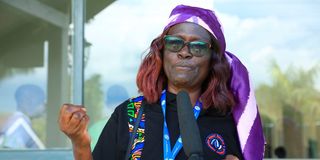Counties, State on the spot over HIV funding

Impact Research and Development Organization CEO, Dr Kawango Agot, at Ciala Resort in Kisumu on October 27 . She said almost 80 per cent of the research conducted on HIV is funded mostly by the US government.
What you need to know:
- Almost 80 per cent of the research conducted on the viral disease is funded mostly by the US government.
- The county and national governments provide the healthcare facilities and workers to conduct the projects.
Health experts have decried the poor involvement of the national and county governments in the funding of HIV/Aids related research.
Dr Kawango Agot, executive director of Impact Research and Development Organization (IRDO), said almost 80 per cent of the research conducted on the viral disease is funded mostly by the US government. The county and national governments provide the healthcare facilities and workers to conduct the projects.
“The government has not invested in research, yet we all understand that we cannot have treatment without research. Somebody must have done research somewhere before the drugs we take, be it for malaria or any other ailment, are made available to patients,” she said.
The scientist argued that over-reliance on donor-funded research denies the country the privilege of owning the programmes.
“When somebody else is deciding on which research a country undertakes, even though we are trying to engage communities, we are not driving the agenda. You can only drive the agenda when money is coming from your pockets. If the money comes from a different donor, they will consult us as a country but ultimately, it is their agenda that we will help or support,” she offered.
The researcher further raised concerns about the need for communities to take control of their health instead of waiting for funding from donors to do the same.
Many times, the expert said, people are often pushed to go to hospitals in search of various services with the help of donor-funded projects when they can do the same on their own.
“When the donkey work is left to the researchers, a programme is likely to come to an end once the study or project is complete. When the donor comes, let them find us already moving and only add to whatever we are already doing to ensure the sustainability of the Programme,” she said.
Dr Agot was speaking during the 20th anniversary of the IRDO celebrated in Kisumu and attended by researchers from across the country.
The IRDO director said she is currently working on 16 research projects around HIV prevention and management.
The research, she noted, has been driven by the growing concerns about the refusal by key population to utilise the available commodities in a quest to lower the transmission of the viral disease.
She noted that the aim of the research is to maximise all the utility of what is already available. Through the organisation, they offer care, treatment and management of malaria, tuberculosis and HIV/Aids to 25 wout of 47 counties in Kenya.
“We have also enrolled a number of key populations to the lifesaving pre-exposure prophylaxis for prevention of the viral disease,” said Dr Kawango, adding that their work also involves advocacy and behavioural interventions targeted to reduce HIV prevalence.
According to the recently launched World Aids Day Report, the country recorded an increase in new HIV/Aids infections by 2,000 from 32,025 to 34,540 in 2021.
The report attributed the increase of infections to the frequent shortages of HIV commodities and the new infections among children, adolescents and youth.




